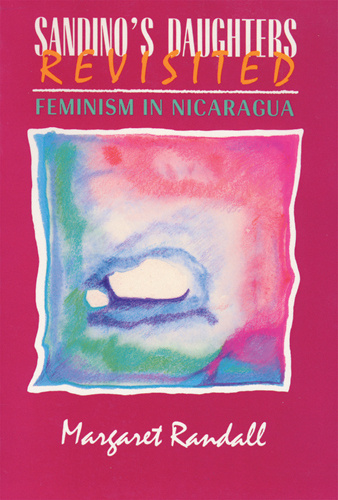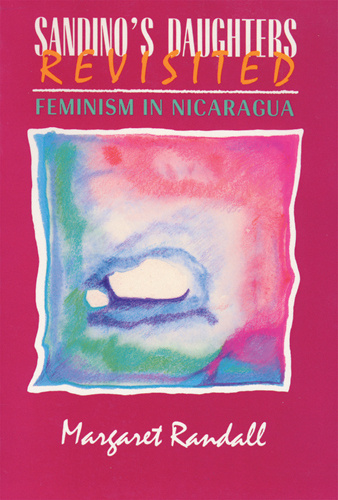Sandino's Daughters, Margaret Randall's conversations with Nicaraguan women in their struggle against the dictator Somoza in 1979, brought the lives of a group of extraordinary female revolutionaries to the American and world public. The book remains a landmark. Now, a decade later, Randall returns to interview many of the same women and others. In Sandino's Daughters Revisited, they speak of their lives during and since the Sandinista administration, the ways in which the revolution made them strong — and also held them back. Ironically, the 1990 defeat of the Sandinistas at the ballot box has given Sandinista women greater freedom to express their feelings and ideas.
Randall interviewed these outspoken women from all walks of life: working-class Diana Espinoza, head bookkeeper of a employee-owned factory; Daisy Zamora, a vice minister of culture under the Sandinistas; and Vidaluz Meneses, daughter of a Somozan official, who ties her revolutionary ideals to her Catholicism. The voices of these women, along with nine others, lead us to recognize both the failed promises and continuing attraction of the Sandinista movement for women. This is a moving account of the relationship between feminism and revolution as it is expressed in the daily lives of Nicaraguan women.
A collection of varied and amazing lives, all bent on shaping history. Together, these experienced, undeterred Nicaraguan women offer powerful clues about a truly revolutionary and democratizing feminism.
If it were not for writers like Margaret, how would women around the world find each other when there is such an institutional effort to keep us apart and silent? Here Margaret brings us the voice of Sandino's daughters, honoring his hat and wearing their own, wiser now, having been part of political and personal revolution.
A completely new and different book from her earlier Sandino's Daughters. The core is a dozen lengthy interviews with feminist women (all but one), hence not randomly drawn from Nicaraguan society. Randall opens the volume with a useful, wide-ranging interpretative survey of history, politics, and the social situation of women. One observation that sticks: women who most resembled men in their conduct rose highest under Sandinista rule.
Since the defeat of the Sandinistas at the Nicaraguan polls in 1990, which surprised winners and losers alike as well as their supporters and most observers, much ink has been spilled in attempts to determine the causes. And while Nicaragua has faded from the front pages of U.S. newspapers, some are still interested in what road Nicaragua would then follow. Sandino's Daughters Revisited, Margaret Randall's collection of twelve oral histories with women involved in the Sandinista revolution, adds insights into these and other questions. This book is useful for the specialist and non-specialist alike and has much to offer the historian, the teacher, the student, and anyone interested in learning more about the Sandinista Party and the women of Nicaragua.
With Sandino's Daughters Revisited: Feminism in Nicaragua Margaret Randall adds both to her oral history work with women in the Sandinista revolution and to a thesis elaborated in Gathering Rage: The Failure of 20th Century Revolutions to Develop a Feminist Agenda (Monthly Review Press, 1992). This thesis was that the failure to develop a feminist agenda contributed to the failure of revolutionary movements in Latin America in the 20th century, in this case particularly to the Sandinistas' loss of power in the elections of 1990.
A collection of varied and amazing lives, all bent on shaping history. Together, these experienced, undeterred Nicaraguan women offer powerful clues about a truly revolutionary and democratizing feminism.
If it were not for writers like Margaret, how would women around the world find each other when there is such an institutional effort to keep us apart and silent? Here Margaret brings us the voice of Sandino's daughters, honoring his hat and wearing their own, wiser now, having been part of political and personal revolution.
A completely new and different book from her earlier Sandino's Daughters. The core is a dozen lengthy interviews with feminist women (all but one), hence not randomly drawn from Nicaraguan society. Randall opens the volume with a useful, wide-ranging interpretative survey of history, politics, and the social situation of women. One observation that sticks: women who most resembled men in their conduct rose highest under Sandinista rule.
Since the defeat of the Sandinistas at the Nicaraguan polls in 1990, which surprised winners and losers alike as well as their supporters and most observers, much ink has been spilled in attempts to determine the causes. And while Nicaragua has faded from the front pages of U.S. newspapers, some are still interested in what road Nicaragua would then follow. Sandino's Daughters Revisited, Margaret Randall's collection of twelve oral histories with women involved in the Sandinista revolution, adds insights into these and other questions. This book is useful for the specialist and non-specialist alike and has much to offer the historian, the teacher, the student, and anyone interested in learning more about the Sandinista Party and the women of Nicaragua.
With Sandino's Daughters Revisited: Feminism in Nicaragua Margaret Randall adds both to her oral history work with women in the Sandinista revolution and to a thesis elaborated in Gathering Rage: The Failure of 20th Century Revolutions to Develop a Feminist Agenda (Monthly Review Press, 1992). This thesis was that the failure to develop a feminist agenda contributed to the failure of revolutionary movements in Latin America in the 20th century, in this case particularly to the Sandinistas' loss of power in the elections of 1990.
2. "Women's Solidarity Has Given Our Lives a New Dimension: Laughter" / Michele Najlis
3. "I Was a Woman, a Miskito Woman, a Woman from the Coco River" / Mirna Cunningham
4. "The Only Way for Women to Fight for Their Rights Is If They Get Together and Do It" / Diana Espinoza
5. "I Am Looking for the Women of My House" / Daisy Zamora
6. "Our Experience in the FSLN Is What Gives Us This Strength" / Milu Vargas
7. "As a Woman, I Think It Was Worth Living the Revolutionary Process" / Vidaluz Meneses
8. "We Were the Knights of the Round Table" / Gioconda Belli
9. "It Doesn't Matter What Kind of Uniform You Wear" / Aminta Granera
10. "It's True: We Can't Live on Consciousness Alone, But We Can't Live Without It" / Doris Tijerino
11. "Nicaragua Is a Surprising Country" / Dora Maria Tellez
12. "Coming Out as a Lesbian Is What Brought Me to Social Consciousness" / Rita Arauz
13. "Who Was Going to Trust a Montenegro?" / Sofia Montenegro






